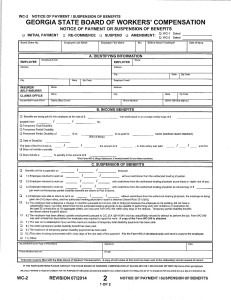All of us use our arms a lot. You don’t think about how much you use them, but you really notice it after you injure your shoulder. A shoulder injury can make it difficult to do routine activities.
I did not realize how much difficulty having a shoulder injury caused until l hurt my shoulder about 20 years ago. I had problems doing many different everyday activities, including the following:
- Putting on my shirt
- Combing my hair
- Reaching up to get dishes or glasses out of a cabinet
A shoulder injury not only makes it difficult to do things around the house, but it can also make it especially difficult to do a job. Almost anyone who suffers a shoulder injury at work will likely face some difficulty when trying to return to work. Almost every job requires us to use our arms to some extent.
So, what do you do if you suffer an on the job shoulder injury and then have to make decisions about going back to work? This article will focus on returning to work with a shoulder injury and how Georgia’s workers compensation law impacts that.
 What types of shoulder injuries make it difficult to return to work?
What types of shoulder injuries make it difficult to return to work?
Not all shoulder injuries are the same. Some shoulder injuries heal up quickly and do not cause continued difficulty.
I was really lucky. The shoulder injury I suffered about 20 years ago was just a minor sprain. It healed up within about a month, and I was feeling completely better.
Unfortunately, many people are not so lucky. They suffer more serious shoulder injuries. One of the most common types of shoulder injuries I see is a rotator cuff tear. This type of injury often requires surgery to repair the tear. Sometimes, more than one surgery is required.
Other types of shoulder injuries can require surgery as well. Hopefully, your shoulder injury will heal up quickly. But, regardless of what type of shoulder injury you suffer, you may have difficulty returning to work.
Why would my shoulder injury cause me to have difficulty doing my job?
As I mentioned earlier, most of us do not realize how much we use our arms. You just take it for granted when you are able to use your arms without difficulty.
Most people have jobs that require them to use their arms frequently. Some of the most common types of jobs that people have difficulty performing after shoulder injuries include:
- Jobs that require lifting heavy objects
- Work that requires you to use your arms repetitively for reaching or lifting
- Jobs that require you to work with your arms overhead or above shoulder level
While people performing these types of jobs may find it especially difficult to return to work, a shoulder injury can make it difficult to return to any type of work regardless of what your job requires.
What if my employer offers me a light duty job before I have shoulder surgery?
Your employer can offer you a light duty job at any point. They can even offer you a light duty job when the doctor has recommended surgery. This can be frustrating because you do not want to undergo a setback or suffer additional injury before your surgery.
The important question is whether the job offered to you by your employer is suitable. In most circumstances, your treating doctor will decide whether the job is suitable.
For example, your doctor may recommend that you restrict yourself to no lifting over 10 pounds and no overhead work. These restrictions from your doctor usually carry a lot of weight in determining whether a potential job is suitable if your case goes in front of a workers compensation judge. But, your testimony and the opinions of other doctors can carry some weight as well.
Georgia has some special rules that apply to light duty job offers. These rules address payment of benefits and attempts to return to work after an injury.
If you are dealing with a situation where your employer has offered to bring you back to work or may do so in the future., you need to know these light duty job rules or have an attorney on your side who does. Just click here to read an article I wrote that discusses those special rules in more detail as well as some of the pitfalls you could encounter if you do not understand these rules.
 What happens when I return to work after shoulder surgery?
What happens when I return to work after shoulder surgery?
Georgia’s law pretty much treats light duty job offers after surgery the same as job offers before surgery. The important question will be whether the job offered is suitable.
One issue that usually comes up after surgery is that the doctor may transition you to work that is more physically demanding. The typical transition to return to work goes something like this:
- Initially, the doctor will probably take you completely out of work following shoulder surgery;
- Then, the doctor will release you to return to work with pretty severe restrictions, like being restricted to sedentary work;
- Ultimately, the doctor will either place permanent work restrictions on you or release you to full duty.
If your employer offers you light duty work, your job may change over time as these restrictions change. Often, your doctor will order a functional capacity evaluation to make a determination about whether you can go back to full duty work or should remain on work restrictions.
Functional capacity evaluations, also known as FCEs, are very important in determining what future workers compensation benefits you can receive. The results of a functional capacity evaluation are especially important when you have ongoing problems from the injury to your shoulder. A bad functional capacity evaluation could cause your workers compensation benefits to get reduced or suspended.
What happens if I reinjure my shoulder after returning to work?
You may end up with an entirely new workers compensation case if you suffer a new injury. If you think you have suffered another injury or made your original injury worse, you will want to be careful and see how the insurance company treats it.
Often, the insurance company will try to use your original date of injury instead of the new injury. Because of the limits that Georgia law has on how long you can receive benefits, using the original date of injury can often hurt your case. You are often better with the new date of injury applying to your case.
If you suffer a new injury, you need to make sure that it is documented. I would also recommend that you talk to me or another workers compensation attorney to make sure the insurance company handles the new workers compensation claim correctly. If the new injury does not get documented correctly, you often will not receive the benefits you should. Also, there are time limits and deadlines you have to be careful about if the insurance company does not file the proper paperwork for the new injury.
What if my shoulder injury prevents me from returning to work?
If your shoulder injury prevents you from returning to work, you will probably continue drawing workers compensation temporary total disability benefits for some time. Usually, the insurance company has to pay these benefits to you if your injury prevents you from going back to work.
After some time, the insurance company often tries to reduce your benefits by filing a Form WC-104. This form often allows the insurance company to reduce the amount of weekly benefits you receive to temporary partial disability. It also reduces the time limit for you to receive workers compensation wage loss benefits.
Living off of workers compensation weekly benefits can be hard enough when you receive the full amount each week. It often becomes much harder when the weekly amount gets reduced by a Form WC-104 going into effect.
 Does my employer have to provide me with a light duty job for my shoulder injury?
Does my employer have to provide me with a light duty job for my shoulder injury?
Georgia’s workers compensation law does not require your employer to provide you with a light duty job. Basically, your employer has two choices. They can either:
- Provide you with a suitable light duty job; or
- Pay you weekly workers compensation benefits.
This is the basic rule, but there are are some exceptions. You generally cannot force your employer to provide you with a light duty job. Under Georgia’s workers compensation rules, your employer can usually choose to pay you benefits instead of providing light duty work.
It is important to clarify that I am only talking about Georgia’s workers compensation rules. Some other state or federal laws might require your employer to provide you with work if they are able to accommodate your restrictions. These laws can be important if you want to return to work and your employer is not accommodating you.
Can my employer fire me if I cannot go back to my regular job?
In Georgia, most employees are in an “at will employment” situation. This basically means that your employer can fire you for a good reason, a bad reason, or no reason at all.
There is nothing in Georgia’s workers compensation law that prohibits your employer from firing you if you are unable to return to your job. Again, other areas of state and federal law may provide you with some additional protections that prohibit your employer from firing you for certain reasons.
One important thing to consider is that being fired does not usually end your entitlement to workers compensation benefits. Many people make the mistake of thinking that their workers compensation case ends if they are no longer working for the employer where they got hurt.
Your workers compensation benefits can continue after you are fired, laid off, or resign. But, the manner in which you leave your job does have a large impact on what benefits you will receive and whether you will have to fight in court to get those benefits.
The main thing to know is that you do not need to delay things if you are fired or get laid off from your job. The biggest mistake I see people making is waiting too long and not taking action soon enough after they get fired or laid off. Failure to take action can lead to missing deadlines and losing the right to workers compensation benefits.
Can I settle my case after returning to work?
Yes. You can settle your case after returning to work. But, returning to work often affects the amount the insurance company will offer you to settle.
The reason that returning to work affects the insurance company’s settlement offer is that insurance companies make settlement decision based on what your case will cost them in the future. If you return to work and are no longer getting weekly workers compensation wage loss benefits, your case is now probably costing them less.
Since there are special rules about light duty and returning to work affects settlements, many people find it helpful to reach out to an attorney to get information when they are considering returning to work. If you want to set up a free consultation about your case, just click here to find out more information.
 What types of shoulder injuries make it difficult to return to work?
What types of shoulder injuries make it difficult to return to work? What happens when I return to work after shoulder surgery?
What happens when I return to work after shoulder surgery? Does my employer have to provide me with a light duty job for my shoulder injury?
Does my employer have to provide me with a light duty job for my shoulder injury?








